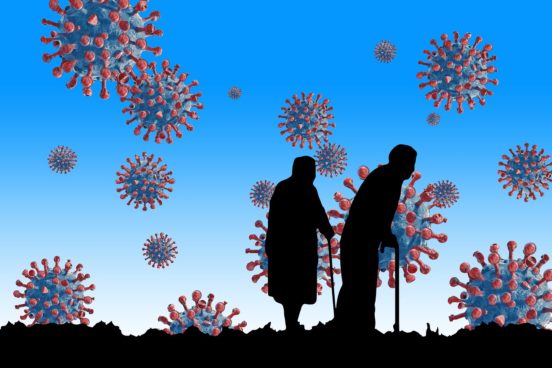Lloyd Rees, when discussing Australian modern art, argued that ‘the universal element in art, I feel, has often come from an intense localism’ (Rees in Butler & Donaldson 2015, 142).
This quote has stayed with me since my Art History degree: Lloyd Rees was originally referring to the conflict between indigenous and Western symbolic vocabularies in the increasingly international trope of Australian modern art in 1930s Sydney. Although this quote is far from my life as a part-time GP receptionist, part-time Masters student in Global Health Policy in Scotland, the importance of ‘the local’ has been re-emphasised during the coronavirus pandemic. Working in the setting of community health has taught me that the universal element in healthcare often comes from intensely local care: care that is personalized, close to home and promotes both health and social well-being. The importance of local care has become central to the devastating impact of coronavirus in elderly populations, is an ongoing topical issue of care homes (Observer Reporters, 2020) and is changing what care will become.
The UK population is ageing, and our health policy is adapting to suit the needs of this demographic. It is predicted that in 2066, 26% of the population will be 65 or older, compared to 18% in 2016 (ONS, 2018). Much of the integrated care that allows older people to be cared for at home was only established 20 years ago. In 2000 the NHS Reform Plan (Department of Health, 2000) introduced a new tier of services called ‘intermediate care’ to facilitate health and social care to older adults living in the community with the understanding that ‘older people have better health outcomes when they receive treatment closer to home’ (British Geriatrics Society 2019). The plan for care homes is arguably still being written. A key question being asked is; ‘Could nursing homes (NHS) transform from settings in which many residents dwell to settings in which the NH residents and those living in neighboring communities benefit from staff expertise to enhance quality of life and maintain or slow functional decline?’ (Laffon de Mazières 2017). Person-centred dementia care is an area of research that ‘is no longer seen as the ‘Cinderella’ part of the health service, but a progressive, specialist field’ (Baker 2015, 17).
In the first international study ‘that reviewed international COVID-19 guidance for a highly vulnerable population’ (Gilissen 2020, 10), the authors noted that in the guidance for nursing homes ‘several key aspects of palliative care, practical guidance, and broader structural and coordination considerations are largely absent’ (Gilissen 2020, 9). Aspects that were not addressed included: ‘holistic symptom assessment and management at the end of life… staff training (in particular for care assistants who deliver the majority of hands-on care in these settings)… comprehensive ACP communication… support for family including bereavement care, support for staff, and leadership and coordination related to palliative care’ (Gilissen 2020, 9&10).
Caring for the elderly is a complex and fragmented task. In the current pandemic politicians and health professionals should continue to work on effective strategies to prevent coronavirus in care homes, such as barrier nursing, testing of hospital patients discharged to homes, and testing of staff (Department of Health and Social Care 2020). However the difficulty of the task has been translated into public uncertainty, particularly around palliative care. Palliative care doctor Rachel Clarke writes in The Guardian, ‘the outrage over allegations that doctors have apparently been using the coronavirus pandemic to write off whole swathes of vulnerable patients has been painful to witness’ (Clarke 2020). As the pandemic continues the growing percentage of elderly deaths (Observer Reporters 2020) is a worrying statistic. The difficult and often misunderstood subject of palliative care, particularly in care homes, is therefore a topical and important issue. Working on the GP reception desk I am aware of the difficulties our local care home faces, and in order to find out more I spoke to the lead GP.
‘Care homes have more experience of death than the hospitals’, the GP pragmatically stated. ‘The majority of residents die within a few years of being admitted.’ Care homes therefore have a medical role in providing adequate healthcare and nursing support to patients. However, as the GP explains, ‘our interactions with the care home have been chaotic for years.’ Many care homes are profit-run organisations which are sadly understaffed in nursing roles. In Scotland the 2018 GP Contract (Scottish Population Health Directorate 2018) introduced the new role of Care Home Liaison Nurse, which as the GP lauded, ‘is one of the most significant additions to primary care’. This role has implemented a more organised system of communication as the nurses are now able to deal with the majority of calls from care homes and treat minor problems without the GP. In recent weeks the GPs and nurses have been supporting the care homes in the difficulties of preparing for coronavirus in the homes.
‘For the care homes now we are prescribing to every resident JIC medication, in case they need palliative support,’ the GP explains. ‘Residents are unlikely to be admitted to hospital if they contract COVID-19, and so will need the support in care homes in case it is terminal.’ Palliative JIC medication eases pain and confusion in the dying process. Ensuring that residents are able to get this medication is not to say that they will die, but to provide the correct medical support if needed. ‘Patients are having more distressing deaths in homes. I heard about a patient who needed extra morphine and midazolam. That is unusual’, the GP continues.
‘Care homes can be depressing places. They don’t always have the right mental stimulation for patients,’ the GP laments. ‘It is like the Dylan Thomas poem Do not go gentle into that good night. Your last few years of life have to be enjoyable. If you don’t have a satisfactory life, it prolongs your pain in death and you will fight death. But if you have a good experience of life at the end, dying is a lot easier.’
Care homes are important places that look after a vulnerable population often in the last years of life. For relatives the cost is huge, financially given a private sector nursing home costs an average of £847 per week (Curtis 2018) and emotionally costly too. For the elderly themselves however, living in a care home can be an experience of a ‘social death’. A social death is described as ‘the ways in which someone is treated as if they were dead or non-existent’ (Borgstrom 2017, 5). In this difficult position the elderly are vulnerable, lacking independence and voice, and in society we feel unable to talk about our elderly because ‘we lack a script, in general, for our long dying’ (Banner 2016, 7). People are living longer than ever and ‘because degenerative, chronic conditions have replaced acute diseases as the major cause of mortality’ (Abel, 2017, 1), death is now a gradual rather than sudden progress. This new chapter of life can be a complicated conclusion, with a variety of new medical, financial and social needs. It is a chapter for which ‘a script is sorely needed’ (Banner 2016, 7).
As Rachel Clarke notes in The Guardian, ‘pandemic medicine, we are learning, is far from ideal’ (Clarke 2020); but the flaws it exposes are the problems we need to solve. In Gilissen’s study of COVID guidance, the author noted that ‘non-physical (psychological, social or spiritual) needs were hardly addressed’ (Gilissen 2020, 10). Non-physical needs are important to our quality of life and ‘communication about the patient’s care values and preferences [are important] to develop a care plan for the future’ (Sebern et al. 2018, 644). However our non-physical needs are also in part our non-medical needs, and discussions of how to care for the elderly go beyond the hospital and the care home. ‘Ideally, the patient should be at the heart of these discussions. Failing that, then their family, loved ones or advocate should, if possible, be consulted’ (Clarke 2020). The conversation about care for the elderly is a subject we all need to be part of.
‘Epidemics are “mirrors held up to society”, revealing differences of ideology and power as well as the special terrors that haunt different populations’ (Briggs 2003, 8). The impact of coronavirus on care homes will haunt the UK public, particularly the relatives of residents which many of us are. But as the British Geriatrics Society reminds us, ‘ageism remains widespread. Quality of care of elderly patients remains a core criticism in spite of numerous reports and commissions in the past 20 years’ (BGS 2016). For the future, recognizing the vulnerability of the elderly, learning from the uncertainty and lack of guidance in COVID-19 and researching how to provide care for both physical and non-physical needs will be important to ensuring quality care for the elderly. The script for care homes will not be easily written, but the final chapter of our lives needs a personal, local and socially integrated conclusion. As American care activist Ai-jen Poo argues ‘the universality of the caregiving experience is certainly the basis for the next great wave of change’ (Poo 2017).
Taken from interviews for https://www.rovingreceptionist.com/. Interview reproduced with permission.
Niamh Woodier is currently in the Masters in Science program in Global Health Policy at the University of Edinburgh and works as a part-time GP receptionist. Working as a receptionist has given her an insight into the struggles patients and relatives face in caring for elderly relatives in a complex care system, and the anxiety everyone is facing currently about the status of their health. In order to informally document this time of change, she set herself up as a ‘roving receptionist’ to give a local and personal voice in the global crisis. She says: “It has been a privilege to engage with wider policy issues during my degree at Edinburgh, and in the future I hope to be able to advocate for the ethics of care.”
References:
Abel, E.K. (2017). Living in Death’s Shadow: Family Experiences of Terminal Care and Irreplaceable Loss. Baltimore: Johns Hopkins University Press., doi:10.1353/book.49471 [Accessed 22nd May 2020].
Baker, C. (2015). Developing excellent care for people with dementia living in care homes (Bradford Dementia Group good practice guides). London, [England] ; Philadelphia, Pennsylvania: Jessica Kingsley.
Banner, M. (2016). Scripts for Modern Dying: The Death before Death We Have Invented, the Death before Death We Fear and Some Take Too Literally, and the Death before Death Christians Believe in. Studies in Christian Ethics, 29(3), 249–255. https://doi.org/10.1177/0953946816642967 [Accessed 18th May 2020].
Borgstrom, E (2017), Social Death, QJM: An International Journal of Medicine, Volume 110, Issue 1, January 2017, Pages 5–7, https://doi.org/10.1093/qjmed/hcw183 [Accessed 18th May 2020].
Briggs, C.L. & Mantini-Briggs, C., (2003). Stories in the time of cholera : racial profiling during a medical nightmare, Berkeley, Calif.: University of California Press.
British Geriatrics Society (2016) A Brief History of the Care of the Elderly Available online: https://www.bgs.org.uk/resources/a-brief-history-of-the-care-of-the-elderly [Accessed 18th May 2020].
British Geriatrics Society (2019) ‘The NHS long term plan promises better care closer to home but our hospitals must not be left behind’ says British Geriatrics Society’s President. Available online: https://www.bgs.org.uk/policy-and-media/%E2%80%98the-nhs-long-term-plan-promises-better-care-closer-to-home-but-our-hospitals-must [Accessed 18th May 2020].
Butler, R. & Donaldson, A.D.S., (2008). Stay, Go, or Come: A History of Australian Art, 1920-40. Australian and New Zealand Journal of Art: 21st-Century Art History, 9(1-2), pp.118–143. [Accessed 18th May 2020].
Clarke, R. (2020) Do not resuscitate’ orders have caused panic in the UK. Here is the truth. Guardian online, https://www.theguardian.com/commentisfree/2020/apr/08/do-not-resuscitate-orders-caused-panic-uk-truth [Accessed 18th May 2020].
Curtis, L. & Burns, A. (2018) Unit Costs of Health and Social Care 2018, Personal Social Services Research Unit, University of Kent, Canterbury. https://doi.org/10.22024/UniKent/01.02.70995 [Accessed 18th May 2020].
Department of Health (2000) The NHS Plan: a plan for investment, a plan for reform. London: Department of Health https://navigator.health.org.uk/content/nhs-plan-plan-investment-plan-reform-2000 [Accessed 26th March]
Department of Health and Social Care (2020) Government launches new portal for care homes to arrange coronavirus testing https://www.gov.uk/government/news/government-launches-new-portal-for-care-homes-to-arrange-coronavirus-testing [Accessed 25th May]
Gilissen J., Pivodic L, T. Unroe K., Van den Block L,. (2020) International COVID-19 palliative care guidance for nursing homes leaves key themes unaddressed. Journal of Pain and Symptom Management, Volume 0, Issue 0 (article in press) Available as Journal Pre-proof at: https://www.jpsmjournal.com/article/S0885-3924(20)30372-9/pdf [Accessed 19th May 2020].
Laffon de Mazières, C. et al., (2017). Prevention of Functional Decline by Reframing the Role of Nursing Homes? Journal of the American Medical Directors Association, 18(2), pp.105–110.
Observer Reporters (2020) Across the world, figures reveal horrific toll of care home deaths. Guardian online,
https://www.theguardian.com/world/2020/may/16/across-the-world-figures-reveal-horrific-covid-19-toll-of-care-home-deaths [Accessed 18th May 2020].
Office for National Statistics (2018) Living longer: how our population is changing and why it matters https://www.ons.gov.uk/peoplepopulationandcommunity/birthsdeathsandmarriages/ageing/articles/livinglongerhowourpopulationischangingandwhyitmatters/2018-08-13#how-is-the-uk-population-changing [Accessed 26th March]
Poo, A.-jen, (2017). Generation X: Being the Change We Need. Generations, 41(3), pp.90–92. Available online: https://search-proquest com.ezproxy.is.ed.ac.uk/docview/1968940960?accountid=10673&rfr_id=info%3Axri%2Fsid%3Aprimo [Accessed 19th May 2020].
Scottish Population Health Directorate (2018) The 2018 General Medical Services Contract in Scotland. Edinburgh: Scottish Government https://www.gov.scot/publications/gms-contract-scotland/ [Accessed 26th March]
Sebern, Margaret D., Sulemanjee, Nasir, Sebern, Mark J., Garnier‐Villarreal, Mauricio, & Whitlatch, Carol J. (2018). Does an intervention designed to improve self‐management, social support and awareness of palliative‐care address needs of persons with heart failure, family caregivers and clinicians? Journal of Clinical Nursing, 27(3-4), E643-E657.










Comments by Ritti Soncco